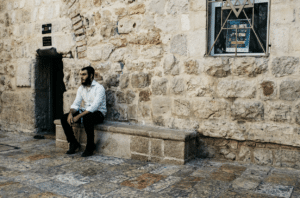The disciples asked Jesus for some prayer tips—after all, He should know. How should we pray? In Jewish tradition, and for some Christians too, prayers are a fixed script to read out. For many from these backgrounds, making up a prayer from the heart can feel strange or overwhelming, so set words can be a helpful guide as we try to connect with God. Like training wheels on a bicycle, these words help us to get going in the right direction. The disciples’ request led Jesus to impart some important truths in what has become known as “The Lord’s Prayer”. These are the words Jesus recommended for us to pray to the Father, as recorded in the Gospel of Matthew, chapter 6:
 “Our Father in heaven,
“Our Father in heaven,
hallowed be your name.
Your kingdom come,
your will be done,
on earth as it is in heaven.
Give us this day our daily bread,
and forgive us our debts,
as we also have forgiven our debtors.
And lead us not into temptation,
but deliver us from evil.”
Perhaps you know these words inside out and back to front. Then again, perhaps it’s the first time you’ve read them. Either way, this prayer is deep.
God is our Father
It’s no small thing that Jesus right away has us address God as “Our Father”. Not “my” Father, you’ll notice—he’s the Father of all of us. For some, this description of God as father can be painful or difficult. Why does God connect Himself with the concept of fatherhood, with all the connotations that brings?
Muslims pray to Allah who is described as merciful, but in Islam it’s impossible to be certain whether you’re in Allah’s good books or not. Allah is not like a “father”, and his love does not feature in the Quran. The God of Israel, on the other hand, is portrayed as a loving Father who is compassionate when we mess up. I love the last line of this especially:

As a father shows compassion to his children,
so the Lord shows compassion to those who fear him.
For he knows our frame;
he remembers that we are dust.
(Psalm 103:13-14)
Even if we do no better than a bucket of dust, He still loves us. In Deuteronomy 32 and 33 we see pictures of God carrying us, like an eagle carrying its young (32:11) or a father carrying his child on his shoulders (33:12). We also see this tender, fatherly language in Isaiah 41, despite Israel’s less than brilliant behavior:
For I, the Lord your God,
hold your right hand;
it is I who say to you, “Fear not,
I am the one who helps you.”
God holds our hand and carries us like a father. Even if you think you’re a bit old to be carried, God doesn’t think so:
“Even to your old age I am he, and to gray hairs I will carry you. I have made, and I will bear; I will carry and will save.” (Isaiah 46:4)
The Bible tells us that there is a big difference between God and our earthly parents, who might have tried their best, but no one can love us perfectly like God can. Whether your father was good, bad, or absent, it’s not his character that God is mirroring, but the ideal of the role of fatherhood: the source, the head, and the righteous authority covering us who loves us very much.
For my father and my mother have forsaken me,
but the Lord will take me in. (Psalm 27:10)
No matter what has happened to us here on earth, we can approach God as our Father in heaven, confident that He cares for us.
Even though God is neither limited to being male or female, He has chosen to reveal Himself as our Father rather than our mother because fathers generally carry authority and have responsibility to provide and protect, aspects which come through later in the prayer. God is infinitely kind and nurturing as well—and all of the goodness of motherhood came from Him too. Male and female, mother, father and child were all His idea. But since Jesus tells us to address God as our Father, it’s important to respect that.
His name is holy
But the very next line in the Lord’s Prayer also helps to remind us who we’re talking to: God’s name is holy. That’s what hallowed means. It’s set apart, not to be thrown around mindlessly. We need to treasure God’s name and give Him respect as we turn our minds to Him. We enter His courts with praise, by giving Him the honor He is due.
What does it mean to be holy? There are some great people who don’t know God yet are still loving and compassionate, some might be described as mighty, just, powerful, and kind… but holy? Holiness is something that pertains only to God and only those who are connected with Him can share in that attribute. He is “other”, set apart. When we say His name is holy, or hallowed, we are remembering that as the Creator, He is not limited to this created order but is far above and beyond it. He can do as He pleases, and He is perfect in all His ways. No one else is like Him. This is our Father. The best Father there is.
The Kingdom of God
When we say, “Your kingdom come”, what does that mean? God’s kingdom can be a bit of a confusing concept. Here’s why:
“Repent, for the kingdom of heaven is at hand.” (Matthew 3:2)
“Not everyone who says to me, ‘Lord, Lord,’ will enter the kingdom of heaven, but the one who does the will of my Father who is in heaven.” (Matthew 7:21)
“But if it is by the Spirit of God that I cast out demons, then the kingdom of God has come upon you.” (Matthew 12:28)
“Truly, I say to you, unless you turn and become like children, you will never enter the kingdom of heaven.” (Matthew 18:3)
Sometimes the kingdom of God is described as something to come later, after judgement, and other times its described as already present – at hand, here, come upon you, already in you…
Being asked by the Pharisees when the kingdom of God would come, he answered them, “The kingdom of God is not coming in ways that can be observed, nor will they say, ‘Look, here it is!’ or ‘There!’ for behold, the kingdom of God is in the midst of you.” (Luke 17:20-21)
So God’s kingdom is near, at hand, it’s coming, where the faithful end up after judgement, but it’s also in you, in your heart… so what is it?
The kingdom of God is essentially wherever God rules.
God’s kingdom rule can be in your heart, in your home, it can be close by, it was definitely at hand wherever Jesus went, and it’s also with God in the heavens, waiting for us in all its fullness. It’s where God’s will is done. And that’s what we’re asking for in this prayer: God’s perfect kingdom rule. Things to be done His way, on earth as it is in heaven. One day there will be new heavens and a new earth where everything is as God intended. Can you imagine? Bring it on—I can’t wait. Yes, Father!
Your kingdom come,
your will be done,
on earth as it is in heaven.
Give us this day… God is our provider
Jesus told us to ask for daily bread from God. Daily. Not weekly, monthly, or even a few days at a time. We are to look to God to provide for our needs on a day to day basis. Tomorrow, as Jesus points out elsewhere, has enough troubles of its own. This mentality of praying for, and expecting, daily provision helps to fight both greed and the fear of lack. In the desert as the Israelites were wandering, God provided manna every single day. They even got a double portion on Fridays to cover Saturday as well, so they could relax on Shabbat. Is it conceivable that God could have abandoned them to starve in the desert? No! But we read about their lack of faith as they complained and then idolatry started to kick in. Idolatry is a result of fear of lack. We try to get our needs met outside of God’s provision and it comes from a lack of trust, and rebellion against God.
Satan can only take and twist what already exists, but God is a never-ending fountain of provision. He can make stuff out of nothing at all.
“The thief comes only to steal and kill and destroy”, warned Jesus. “I came that they may have life and have it abundantly”. (John 10:10)
Jesus fed 5,000 with five loaves and two fish. But did you know God had done this before about 900 years beforehand? In the story with Elisha, God miraculously provided for 100 people using just 20 loaves:
A man came from Baal-shalishah, bringing the man of God bread of the firstfruits, twenty loaves of barley and fresh ears of grain in his sack. And Elisha said, “Give to the men, that they may eat.” But his servant said, “How can I set this before a hundred men?” So he repeated, “Give them to the men, that they may eat, for thus says the Lord, ‘They shall eat and have some left.’” So he set it before them. And they ate and had some left, according to the word of the Lord. (2 Kings 4:42-44)
God can provide, no matter how dire the situation might seem. There are many stories of miracles of provision happening now, in our days. In Psalm 23 when we’re reminded that the Lord is our shepherd, we read about being cared for, sat down on grassy places and fed, and our cup running over. This is who our Father is.
Similarly, in the patterns God lays out for temple worship there are grain offerings that need to be brought morning by morning (Ezekiel 46:14) as well as showbread that must be presented. Is God hungry? Or is there a principle here? We need fresh manna daily, fresh bread. Jesus tells us we can expect our Father God to provide for us day by day.
Forgive us our sins
Right after talking about daily bread, Jesus teaches us to pray for forgiveness. And this is not the first time that He has linked the ideas of bread with forgiveness.
Now as they were eating, Jesus took bread, and after blessing it broke it and gave it to the disciples, and said, “Take, eat; this is my body.” And he took a cup, and when he had given thanks he gave it to them, saying, “Drink of it, all of you, for this is my blood of the covenant, which is poured out for many for the forgiveness of sins. (Matthew 26:26-28)
Jesus said, “I am bread of life” (John 6:35), and it’s been pointed out that He made the connection between Himself, bread, sacrifice, and forgiveness. We mess up pretty much every day, and need forgiveness all the time. But God’s mercies are new every morning. Day by day.
Importantly, as Jesus explains right after the Lord’s Prayer and again in Matthew 18, our forgiveness is also linked to our willingness to forgive others. Jesus tells us we must forgive others in the same way that we have been forgiven by God, which is to say, freely and without limit. Forgiving is not the same thing as saying it’s ok (if it really was ok then no forgiveness would be needed) nor is it necessarily being willing to trust someone (which may not be wise), but it is releasing that person and situation to God, trusting our Father to deal with them instead. As we forgive, we can let go of our anger, bitterness and resentment, knowing that God is perfectly just. He can take care of it, and we can let go. We are forgiven and free.
Keep us from evil… God is our protector
 If we are tracking with Jesus, trusting our Father to provide and forgive, we will already be sidestepping a lot of angst and evil. The freedom that comes from knowing we’re forgiven liberates us to live differently and releases us from being driven by guilt. A guilty conscience and the bitterness of unforgiveness is what drives so much of the evil in this world today. They can make us easy prey to Satan and vulnerable to deception. Much of the virtue signaling craziness that so easily descends into chaos and violence is just driven by a craving for a clean conscience. Similarly, unforgiveness and envy leads to the opposite of loving our neighbor. We have been given all we need to step out of the chains of bitterness, resentment and greed. Our Heavenly Father has provided daily bread and a never-ending stream of forgiveness so that we don’t have to worry or grasp anymore.
If we are tracking with Jesus, trusting our Father to provide and forgive, we will already be sidestepping a lot of angst and evil. The freedom that comes from knowing we’re forgiven liberates us to live differently and releases us from being driven by guilt. A guilty conscience and the bitterness of unforgiveness is what drives so much of the evil in this world today. They can make us easy prey to Satan and vulnerable to deception. Much of the virtue signaling craziness that so easily descends into chaos and violence is just driven by a craving for a clean conscience. Similarly, unforgiveness and envy leads to the opposite of loving our neighbor. We have been given all we need to step out of the chains of bitterness, resentment and greed. Our Heavenly Father has provided daily bread and a never-ending stream of forgiveness so that we don’t have to worry or grasp anymore.
When we know we have all we need in Him, we are less vulnerable to the trap of temptation which offers something second best. We are forgiven, free, and deeply loved. Understanding this will keep us from a great deal of unnecessary evil.
Satan will still try to entrap us and tempt us. Jesus tells us to ask for protection. God is far stronger than Satan, and He is able to keep us from walking headlong into temptation and can deliver us from evil. Our Father is like a mighty warrior by our side.
For His is the kingdom, the power and the glory, for ever and ever. Amen.
Picture by Johannes Plenio on Unsplash















